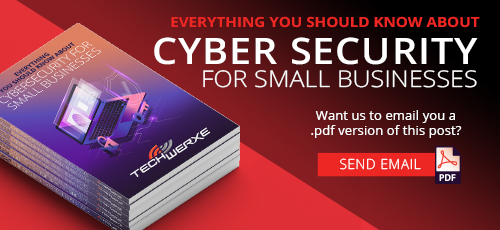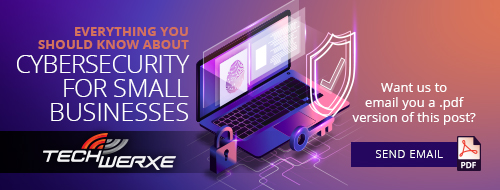Although your business may have upped the IT security budget this past year and followed through with all the recommendations of those boxed products, your small business may still be in danger of a serious hack in 2019. Small businesses are particularly popular victims of cybercrimes; since 2016, as cybercrime extorted as much as 15 to 20 percent of the global internet economy, small businesses accounted for 70 percent of those victims. As a result, cybersecurity for small businesses is paramount in the coming year.
In a perfect world, technology would be the solution just as much as it’s created the problem. Your existing cybersecurity software would be completely capable of keeping your enterprise safe. However, recent research indicates that, for the SMB or very small business, budgets for IT security are shrinking. This makes it almost impossible to achieve the high IT security level needed with a standard IT budget.
Considering the concerns that arise around cybersecurity for small businesses, many SMBs turn to managed IT services providers (MSPs). These businesses offer cybersecurity for small businesses to create, deploy and monitor their digital security complex. Companies in New Jersey and New York should implement high cybersecurity standards to maintain their competitiveness in these hyperactive markets.
What is cybersecurity?
The term “cybersecurity” refers to the capacity to protect the available digital contexts and computing capacities within each against intrusion or exploitation. Many types of cybersecurity programs include protections for networks, applications, data, operations, disaster recovery systems and devices. Each of those elements requires specialized protections. All require monitoring to ensure they remain sufficient against emerging threats.
How is cybersecurity different for small businesses?
For the SMB, the value of comprehensive cybersecurity software is inestimable. These organizations are targeted because they often hold identifiable data of customers and business partners, making them more valuable as a target.
Further, unlike larger organizations, small businesses also often lack the financial and human resources needed to maintain adequate levels of protection.
- Maintaining adequate protections in today’s hyper-extended cyber universe often requires capital investments in new hardware and computing facilities to manage the scale and volume of workloads.
- It also requires increased operating expenses to keep the system up-to-date and capable of monitoring for emerging threats.
- The ongoing maintenance usually requires specialized personnel, too, so add that cost to the budget, on top of your expenses and costs for the core functions of your enterprise.
Even after all that investment, there’s still no guarantee that the subsequent cybersecurity system will be sufficient to detect, prevent or defend against an attack. Even though more than half (54 percent) of all SMBs acknowledge that the existing IT security standards will probably be breached, a full 40 percent report that they lack the insights and intelligence to understand the threats that their companies now face.
Why is cybersecurity for small businesses so important?
Despite the daunting cost potential, as the means of keeping your company’s coffers, data, and reputation safe, your cybersecurity plan is invaluable. You’ll need it to protect all aspects of your digital systems throughout the cyber attack lifecycle:
Preventing, detecting and defending against an attack
Visa reports that 95 percent of credit card breaches happen at SMBs, as thieves use systems hacks, malware, and even ransomware to drain business and customer money. In 2018, infected email delivered over 90 percent of all malware attacks. Your IT security should address each of these types of threats.
Maintaining business continuity
Most businesses try to continue doing business during an attack because having all systems come to an abrupt halt also stops revenue generation. Your IT security plan should include the capacity to maintain productivity despite an attack.
Recovering after the attack
Disaster recovery planning is also often lacking in the SMB. The financial cost of a breach can be expensive and includes loss of assets and income and the cost of replacing contaminated systems elements. If consumer information is involved, those expenses can multiply exponentially. Your security strategy needs a plan to manage the fallout after an attack has occurred.
Considering the cost and losses a breach can cause, it’s no surprise that as many as 60 percent of SMBs simply don’t survive a cyber attack.
Cybersecurity best practices for SMBs
So, what do you do when protecting your SMB is a priority, but the budget interferes? Look for specialized programming to detect threats beaming in from every corner of the tech universe – email, social media, web pages, etc. Other software is also needed to detect internal concerns before they become actual problems. You need to be able to stay in business during an attack and keep the level of damage as low as possible. You want to be able to budget for the right tech solutions to solve all concerns without eroding critical company coffers.
Your first step should be to evaluate your current security situation. Tragically, in many cases, the SMB itself has failed to maintain internal controls over its IT security systems, and that gap opens unnecessary vulnerabilities. Before making any investment decisions, follow these cybersecurity tips to enhance current protections and learn more about your risk profile.
Review passwords and password practices
Almost two-thirds (63 percent) of breaches involved stolen, broken, or insufficient passwords. Today’s best practices suggest using both upper and lower cased letters and at least one number and one symbol. If you haven’t inventoried and updated your corporate passwords lately, now’s the time.
Update software
Many software programs now include security programming. Earlier versions may include them too, but those will be outdated if they are more than a year old. Intentionally updating all software, including programming on mobile devices, will bring the system as current as possible.
Train your workers
Not following security protocols is another unnecessary vulnerability. Phishing (luring workers into clicking on malware-laden emails) is a popular and successful entry into many small businesses. With each upgrade or update, be sure that your staff understands how to maintain the full measure of security offered.
Choosing small business cybersecurity software
Once you’ve done all that you can with your existing systems, it’s time to look for software options that will provide the fuller coverage you need. Choosing the right cybersecurity for small business can be a daunting prospect, however, especially for the non-IT professional business owner.
- There are dozens of options available for any one type of cybersecurity service (hack prevention, disaster recovery, etc.). Keeping the process in-house also requires knowing how to knit a series of new programs together to attain the best functionality.
- Another concern is how to size the programming needed to protect the specific assets of the organization. It makes no sense to purchase an option that covers the workloads of hundreds of workers when your office has only a few dozen.
- You don’t want to skimp, either, and protect some, but not all, of your enterprise. Software designed for home or private use is almost never appropriate to be used for a company’s purposes. This is because it doesn’t contemplate the higher volumes of traffic and workloads. It is not (usually) programmed to defend the types of attacks that company’s face.
Often, business leaders avoid choosing cybersecurity software because of confusion while searching for effective cybersecurity programming. In these cases, the actual best solution is to seek the services of a dedicated and professional IT security company.
Choosing a small business cybersecurity services provider
Here, too, you will find (too) many options, each of which appears promising. All of these options will promise to provide you with everything you think you need. The problem with most MSPs is that they often make early promises without truly understanding your business. They should also understand its markets, vulnerabilities, and goals. Without intense research into the specifics of your enterprise, no MSP can deliver everything that you will need.
Consequently, as you interview prospective MSPs consider their response to these concerns:
How well do they understand your business model?
In addition to your central machines and servers, you may also have a team of remote workers, significant supply chains, or a network of critical partners. You may need to remain compliant with national and international standards, and you may have off-shore satellite facilities that must integrate with your core computing activities. Each element of your system, regardless of its size or configuration, requires an individual assessment to ensure that the security programming encompasses their interactions and vulnerabilities, too.
How well do they understand your current technology environment?
There are many macro-vendors that offer their proprietary solutions to business computing concerns. Often, MSPs affiliate with a small number of these providers and are proficient on their specific programming. Your MSP should be an expert on the technologies you already use.
How comprehensive is their IT security strategy for your enterprise?
You know now that you need more than just strong passwords to stay safe. You also need protections on every end-point. This includes defenses against emerging virus and malware threats. It also includes backup and disaster recovery plan to minimize any damage. Especially in today’s global market sectors, cloud-based solutions are becoming more important. They help maintain adequate protections today with the ability to scale to cover tomorrow’s threats, too. Your potential IT company should be able to walk you through their security strategies for your particular vulnerabilities.
There are often too many concerns to consider when contemplating cybersecurity for small businesses. As you plan the future of your company, learn as much as possible before making any decisions. This ensures you gain the highest possible value from your investment.



